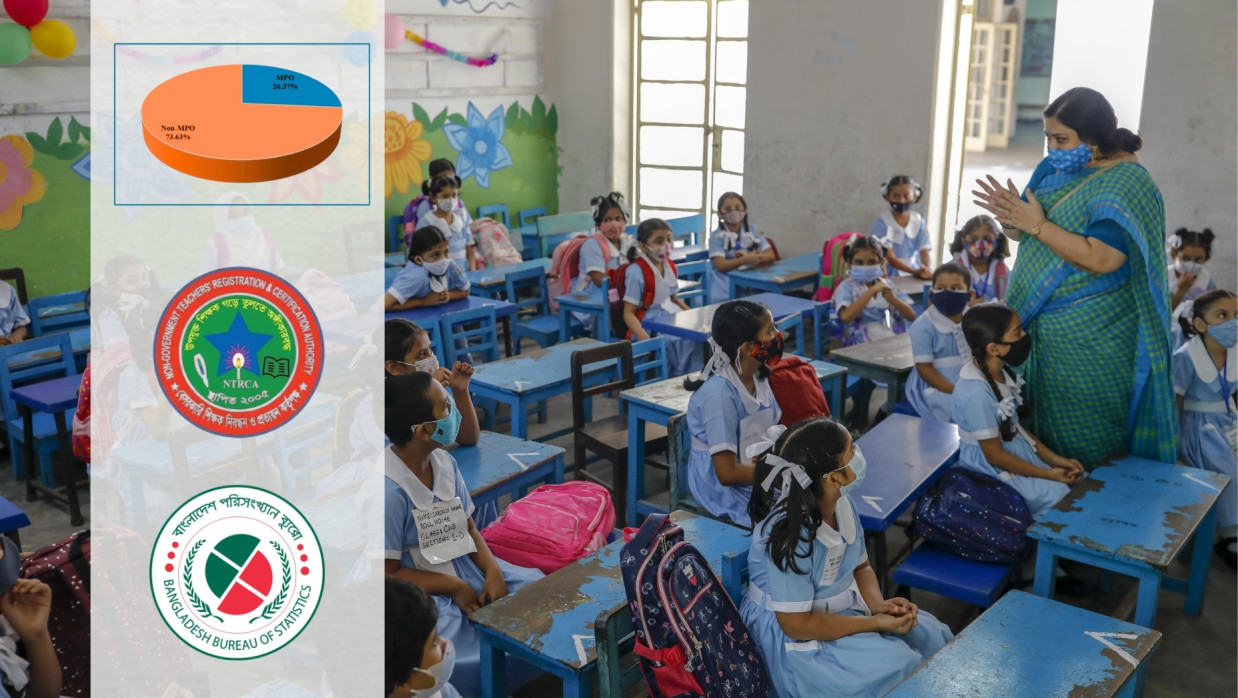
Over 73% of Bangladesh’s Private Educational Institutions Operate Without MPO Support
- ২৩ সেপ্টেম্বর ২০২৫, ১০:৩৯

A staggering 73.6% of private educational institutions in Bangladesh operate without Monthly Pay Order (MPO) support, leaving teachers and staff in financial distress and impacting the quality of education, according to the latest report by the Bangladesh Bureau of Statistics (BBS).
The report reveals that of the 92,392 private educational institutions currently operational, only 26,104 are MPO-supported, while 66,287 function without this financial aid. This means the vast majority of private schools, colleges, technical institutes, and madrasas rely solely on student numbers and tuition fees for revenue, often leading to precarious incomes for educators.
The BBS report encompasses a wide range of institutions, including universities, honors and master’s colleges, medical and dental colleges, NGO-run schools, primary schools, IHT-MATS, polytechnic institutes, and other educational establishments. The lack of MPO support particularly affects teachers in non-MPO schools, colleges, technical institutes, and madrasas, who face severe financial challenges. Their salaries depend heavily on student enrollment and tuition fees, resulting in significant income drops when student numbers decline, often leaving teachers unable to meet basic living expenses.
Professor Dr. SM Hafizur Rahman from the Institute of Education and Research at Dhaka University told The Daily Campus, “While there are policies for establishing private educational institutions, their implementation is often inadequate. Many institutions exist only on paper, lacking a conducive learning environment. There is also a shortage of skilled teachers. MPO-supported teachers already receive low salaries, but non-MPO teachers often receive none at all, making it difficult to attract qualified educators. This directly undermines the quality of education.”
He emphasized that to improve private education standards, the government must bring a significant number of institutions under the MPO framework, ensure the recruitment of qualified teachers, and foster a conducive learning environment. However, he noted a key challenge: verifying the teaching qualifications of staff in institutions selected for MPO inclusion or nationalization. “The government must adopt a phased approach to this process. Without ensuring fair salaries for teachers, educational progress will remain elusive,” Dr. Rahman added.
Breakdown of Non-MPO Institutions
According to the BBS, 822 private institutions could not be categorized by type. Among identified institutions, 5,581 are NGO-run schools, 26,478 are kindergartens, and 4,530 are ebtadayi institutions—all non-MPO. Of the 6,511 dakhil-level institutions, 5,166 are MPO-supported, while 1,345 are not. At the alim level, 1,314 out of 1,395 institutions are MPO-supported, leaving 81 non-MPO. For fazil-level institutions, 1,037 out of 1,083 are MPO-supported, with 46 non-MPO. At the kamil level, only 20 of 267 institutions receive MPO support, leaving 247 non-MPO.
The report further notes that all 13,902 Qawmi madrasas are non-MPO, meaning their teachers receive no government funding. Among primary schools, 6,140 are non-MPO. Of the 2,408 junior high schools, 779 are MPO-supported, while 1,629 are not. High schools number 15,932, with 14,215 under MPO and 1,717 non-MPO. All 123 English-medium schools, 375 nursing and midwifery institutes, 76 law colleges, 114 teacher training institutes, and five sports education institutes are non-MPO.
In technical education, 583 of 1,030 vocational schools and colleges are MPO-supported, while 447 are not. Of 775 polytechnic institutes, only 103 are MPO-supported, leaving 672 non-MPO. All 29 Unani colleges, 66 homeopathy colleges, 297 MATS, 26 IHTs, 72 medical colleges, and dental colleges are non-MPO. Among 1,342 schools and colleges, 1,133 are MPO-supported, while 276 are not. Of 1,342 higher secondary colleges, 488 are MPO-supported, and 854 are non-MPO. For degree colleges, 805 of 859 are MPO-supported, with 54 non-MPO. Among 496 private honors and master’s colleges, 458 are MPO-supported, leaving 38 non-MPO. All 103 private universities fall under the non-MPO category.
Additionally, 6,587 coaching centers operate privately or in partnerships, supporting competitive exam preparation and academic tutoring but not delivering formal curricula.
Government’s Stance on MPO Inclusion
Professor BM Abdul Hannan, Director (College and Administration) of the Directorate of Secondary and Higher Education, told The Daily Campus, “Decisions regarding MPO inclusion are made at the highest government levels and by the Ministry of Education. Not all institutions can be brought under MPO, as thousands have been established without adhering to MPO guidelines. Factors like educational quality and student numbers are considered for MPO inclusion, and deviations from the policy are not permitted.”
The absence of MPO support continues to pose a significant barrier to improving private education in Bangladesh, with experts urging strategic reforms to address teacher shortages, financial instability, and quality concerns.